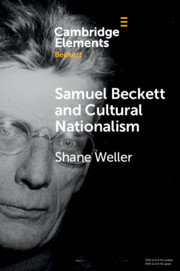Element contents
Samuel Beckett and Cultural Nationalism
Published online by Cambridge University Press: 26 May 2021
Summary
- Type
- Element
- Information
- Series: Elements in Beckett StudiesOnline ISBN: 9781009042277Publisher: Cambridge University PressPrint publication: 24 June 2021
Bibliography
- 9
- Cited by

